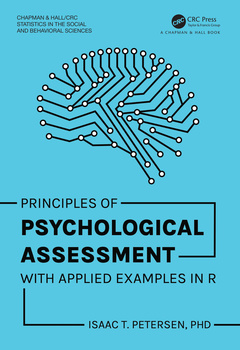Principles of Psychological Assessment With Applied Examples in R Chapman & Hall/CRC Statistics in the Social and Behavioral Sciences Series
Auteur : Petersen Isaac T.

The book highlights the principles of psychological assessment to help researchers and clinicians better develop, evaluate, administer, score, integrate, and interpret psychological assessments. It discusses psychometrics (reliability and validity), the assessment of various psychological domains (behavior, personality, intellectual functioning), various measurement methods (e.g., questionnaires, observations, interviews, biopsychological assessments, performance-based assessments), and emerging analytical frameworks to evaluate and improve assessment including: generalizability theory, structural equation modeling, item response theory, and signal detection theory. The text also discusses ethics, test bias, and cultural and individual diversity.
Key Features:
- Analysis examples using free software
- Helps readers apply principles to research and practice
- Text, analysis code/syntax, R output, figures, and interpretations integrated to guide readers
- Uses the freely available petersenlab package for R
Principles of Psychological Assessment: With Applied Examples in R is intended for use by graduate students, faculty, researchers, and practicing psychologists.
1. Scores and Scales. 2. Constructs. 3. Reliability. 4. Validity. 5. Generalizability Theory. 6. Factor Analysis and Principal Component Analysis. 7. Structural Equation Modeling. 8. Item Response Theory. 9. Prediction. 10. Clinical Judgment Versus Algorithmic Prediction. 11. General Issues in Clinical Assessment. 12. Evidence-Based Assessment. 13. Ethical Issues in Assessment. 14. Intellectual Assessment. 15. Test Bias. 16. The Interview and the DSM. 17. Objective Personality Testing. 18. Projective Personality Testing. 19. Psychophysiological and Ambulatory Assessment. 20. Computers and Adaptive Testing. 21. Behavioral Assessment. 22. Repeated Assessments Across Time. 23. Assessment of Cognition. 24 Cultural and Individual Diversity.
Dr. Isaac T. Petersen is an Assistant Professor at the University of Iowa. He completed his Bachelor of Arts in Psychology and French at the University of Texas, his Ph.D. in Psychology at Indiana University, and his clinical psychology internship from Western Psychiatric Hospital at the University of Pittsburgh Medical Center.
Dr. Petersen is a licensed clinical psychologist with expertise in developmental psychopathology. His clinical expertise is in training parents how to deal with difficult children. He is interested in how children develop individual differences in adjustment, including behavior problems as well as competencies, so that more effective intervention and prevention approaches can be developed and implemented. He is particularly interested in the development of externalizing behavior problems (e.g., ADHD, conduct problems, and aggression) and underlying self-regulation difficulties. Dr. Petersen’s primary interests include how children develop self-regulation as a function of bio-psycho-social processes including brain functioning, genetics, parenting, temperament, language, and sleep, and how self-regulation influences adjustment. A special emphasis of his work examines neural processes underlying the development of self-regulation and externalizing problems, using electroencephalography (EEG) and event-related potentials (ERPs). He uses longitudinal designs, advanced quantitative methods, and multiple levels of analysis, including bio-psycho-social processes, to elucidate mechanisms in the development of externalizing problems. His work considers multiple levels of analysis simultaneously, in interaction, and over lengthy spans of development in ways that identify people’s change in behavior problems over time while accounting for the changing manifestation of behavior problems across development (heterotypic continuity).
On the side, he runs FantasyFootballAnalytics.net where he uses statistical methods to help people win
Date de parution : 04-2024
17.8x25.4 cm



